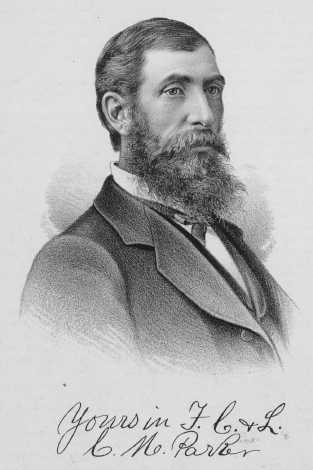inia he went to Van Buren County,
Iowa, where he settled in the year 1851. There he
resided until the year 1874, when with his family he
came to Lancaster County, and settled on the farm now
occupied by his family in Centerville Precinct.
For five years the father of our
subject engaged in farming on his new land, and being
a public-spirited and sociable man, he enjoyed the
confidence and esteem of all who knew him. He approved
of all measures by which the education and cultivation
of the people, and the fertility and general utility
of the country surrounding him, could be secured. He
was a kind and loving father, a devoted and thoughtful
husband, a useful and enterprising citizen, and in his
death, which occurred on the 15th of April, 1879, his
family lost a most considerate and careful protector
and the county one of its best citizens. He was one of
the representative and intellignet German citizens of
his precinct, and we are pleased to record these
memorials of the esteem in which he was held in this
collection of sketches.
Charles Lidolph, our subject, came
with the family to Lancaster County in 1874, and has
since made this place his home. He has become the
owner of 100 acres of the home farm, consisting of 320
acres, which has been accumulated by the industry of
the family. On the 22d of November, 1878, he married
Margaret Baker, who became the mother of two
daughters: Alice M., born Feb. 1, 1881, and Maud M.,
born March 2, 1883, and died July 27, 1887. On the 22d
of February, 1886, our subject was called to mourn the
loss of his loved wife, who departed leaving a great
wealth of love and affection in the hearts of her
husband and daughter, and a large circle of friends to
mourn her untimely death.
What we have said of the father we
can with equal truth and propriety repeat of the son.
He has been a live, active and energetic member of
society, amply qualified by his own attainments to
take :in important share in the political, religious
and educational movements of the day. Bereft of his
helpmate and companion, he has had to work onward and
upward without the encouragement of her smile and her
voice, but her remembrance will ever be dear to
him.
Mr. Lidolph has been active in
educational matters, and is now serving as School
Moderator in his district.
He gives his voice and the influence
of his example in favor of the principles entertained
by the Democratic party in politics, and is an
esteemed member in good standing of the Methodist
Episcopal Church. He has profited well by the example
which his father set him, and that, united to his own
moral worth and steadfastness of principles, entities
him to honorable mention among the leading of his
precinct.

 UDGE
CHARLES M. PARKER. The subject of this sketch, whose
portrait is presented on the opposite page, was born
Aug. 28, 1840, in the village of Geneseo, in
Livingston County, N. Y. In the fall of 1844, his
parents, William and Melinda Parker, with their three
children--Bruce, Helen and Charles--moved to
Tippecanoe County, Ind., where the father followed the
avocation of a farmer, the boys working with him on
the farm during the Summer and attending the district
school in winter; an uneventful life, with little to
disturb the summer's work or winter's study until the
stirring times of 1861, when the Civil War broke out,
when both boys were desirous of enlisting in response
to President Lincoln's first call for 75,000 men, but
the father, being poor health and somewhat in debt on
the farm, persuaded the boys to defer enlisting until
a further demand for a larger army should be needed,
at the same time promising them that in case a general
call should be made and their services actually
needed, that he would make no further objections to
their both going into the service, assuring them that
if his health would permit he, too, would go with
them, though he was then fifty years of age. UDGE
CHARLES M. PARKER. The subject of this sketch, whose
portrait is presented on the opposite page, was born
Aug. 28, 1840, in the village of Geneseo, in
Livingston County, N. Y. In the fall of 1844, his
parents, William and Melinda Parker, with their three
children--Bruce, Helen and Charles--moved to
Tippecanoe County, Ind., where the father followed the
avocation of a farmer, the boys working with him on
the farm during the Summer and attending the district
school in winter; an uneventful life, with little to
disturb the summer's work or winter's study until the
stirring times of 1861, when the Civil War broke out,
when both boys were desirous of enlisting in response
to President Lincoln's first call for 75,000 men, but
the father, being poor health and somewhat in debt on
the farm, persuaded the boys to defer enlisting until
a further demand for a larger army should be needed,
at the same time promising them that in case a general
call should be made and their services actually
needed, that he would make no further objections to
their both going into the service, assuring them that
if his health would permit he, too, would go with
them, though he was then fifty years of age.
It was at such times as this and
such conversations that the father related his
recollections of his grandfather, William Parker, who
served seven full years in the Revolution,
participating in all of the principal engagements of
that war, from Lexington, Monmouth, Bennington, Bunker
Hill, etc., and finally at the siege and surrender of
Yorktown, coming home with a bundle of worthless
Continental money, and his faithful musket which for
years passed
|


